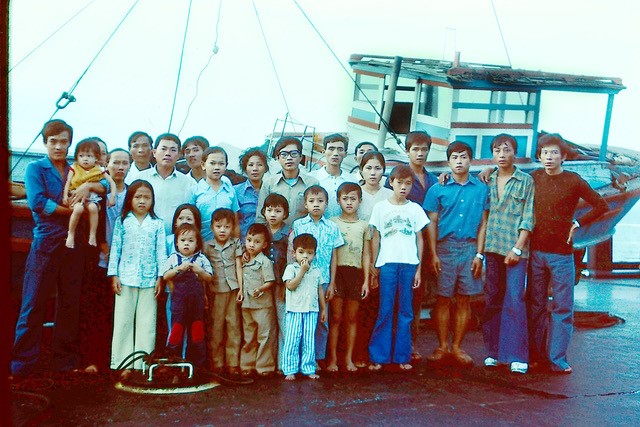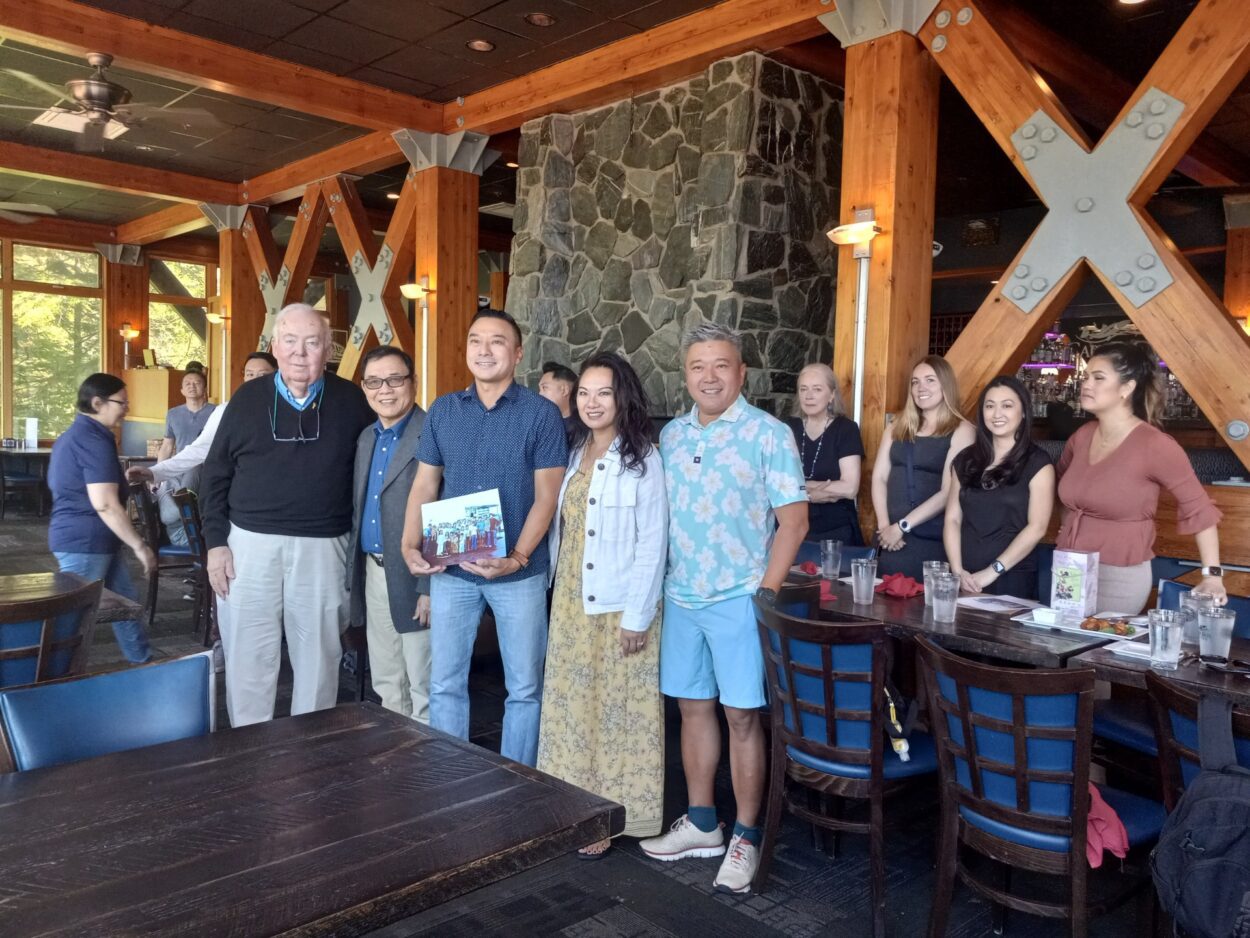
A group of refugees fleeing communist control in Vietnam, including members of the Vo family, stand on the deck of the oil tanker J. Paul Getty in 1978. No Vo is pictured in glasses in the center, with his wife Mai behind his shoulder. Some of his children were on the deck. The Vo family had lunch with Harpold last month. (Photo courtesy Michael Harpold).
It was an emotional reunion for Mike Harpold and No Vo at Ketchikan’s Cape Fox Lodge on a recent Sunday.
The men first met 44 years ago. At the time, Harpold was working as an officer with U.S. immigration services. He had been touring refugee camps from Cambodia to Malaysia as he prepared to present a report on the camps to Congress.
Then he got word that an American cargo ship had plucked a family from a sinking fishing boat hundreds of miles from shore. He was dispatched to the vessel to help the refugees find a home.
“Forty-four years ago, your parents posed for my camera on the deck of the J. Paul Getty, the supertanker that rescued them on the open sea, 450 miles off the coast of the Philippines,” Harpold said. “Starving under Communist rule, they had fled their homeland. But no one in the world wanted them.”
The supertanker tried to see the refugees to Singapore, but the country turned them away. In fact, with the refugees onboard, the tanker couldn’t dock anywhere.
So, Harpold’s wife Elaine said her husband stepped up.
“He said that the U.S. would take these people, so they allowed them to come to shore and go to the refugee camps, and eventually, the U.S.,” she said.
With no authority to do so, Harpold visited the ship and gave every refugee aboard humanitarian parole status. That’s usually reserved for urgent needs like organ donation, or for individuals who usually wouldn’t be let into the U.S.
Harpold called humanitarian parole a “convenient fiction at the time.”
“There was no authority vested in anybody at that time to authorize Vietnamese refugees to be taken to the U.S. for resettlement, but I realized that if I didn’t address the plight of the Getty and the refugees aboard, no vessel hoping to transit the Singapore Straits would come to the aid of a refugee boat in distress in the future, and many more boat people would perish at sea,” Harpold told KRBD as a follow-up after the reunion.
He even wrote a letter to Singapore’s government stating that the refugees on the tanker had a place in the U.S. — even though the U.S. wasn’t accepting Vietnamese refugees at the time.
The Vo family were dropped off at a United Nations refugee camp and the Paul Getty was cleared to continue onward to the Persian Gulf.
“When I reached Washington, D.C. three days later, after some initial discussion about firing me was cleared up, my commitments were confirmed by the attorney general and the secretary of state,” Harpold said. That evening, a wire went out delegating the authorities I had ‘created’ to U.S. Immigration Officers serving anywhere in the world. Mr. Vo, his family, and the others stranded on the Getty were brought to the United States for resettlement, and have lived happily ever after!
The U.S. in the following weeks revised its policies, and over the following decade, 1.5 million war refugees from Viet Nam, Laos, and Cambodia were resettled in the U.S,” he continued. “Two years later, U.S. refugee policy was for the first time codified in the Refugee Act of 1980, and signed into law by President Carter on St. Patrick’s Day that year.”
His choice affected generations of a family he didn’t see again for decades — that was, until the reunion at the Cape Fox Lodge.
Vo’s only daughter, Holly, said the family’s trip to Ketchikan was coincidental. Vo’s children – Holly, Alex, Carson, Paul Getty and Sean Vo – had booked a cruise to Alaska on the Celebrity Solstice to celebrate their father’s birthday.
Before they left, Holly Vo said a family member stumbled upon a book Harpold wrote about the Vos and other Vietnamese refugees called “The People We Wanted to Forget.” They recognized the photo of themselves onboard the J. Paul Getty.
Vo immediately knew he had to visit Harpold during a port call in Ketchikan. He had to thank him.
“It (is) very coincidental and very miraculous and then hopefully this is very lucky for our family to see who helped us 44 years ago to resettle in USA,” he said.
A lunch was arranged. Vo and his wife Mai, their five children, their spouses, and a combined five grandchildren made the trip. Harpold was accompanied by his wife Elaine and daughter Liz.

Members of the Vo family stand with Michael Harpold and his family during lunch at Cape Fox Lodge last month. Carson Vo holds a photo taken by Harpold in 1978, when he granted the Vos “humanitarian parole” on the tanker J. Paul Getty. (KRBD photo by Raegan Miller).
Vo shook Harpold’s hand heartily, becoming emotional beside his children and wife when recalling Harpold’s actions that day in 1978.
“Thank you there’s not enough words to say about what the US government helped us do,” Vo said. “Thank you again, Mr. Harpold.”
Around the table, the Vos and Harpolds shared memories and caught up after 44 years apart. Vo’s oldest son Alex sat next to his wife, down the table from his 12-year-old daughter.
“And, you know, I always told my daughter, I said, ‘You know, if this hadn’t happened, we probably would be either back in our country, or somewhere in some village somewhere, who knows,’” he said. “But the opportunity that this presented itself, I can’t even put a price on it. So the priceless gift you gave us is something you gave us is something we always cherish.”
He explained that when the family got to the country, they first settled in Chicago.
“You know, as any immigrant family, the struggle was real,” he said. “We always share with our kids what we did at their age. And I think they don’t have the concept of how much struggle there was in the beginning. You know, Dad, and Mom, you know, they didn’t know any English, we didn’t either, but they figured it out. And they gave us an opportunity that, you know, I think we really cherish.”
He said because of that, he and his siblings were able to go to school and chase the American dream.
Carson Vo is in business with his older brother. He has three boys of his own now. He has his own memories of the J. Paul Getty.
“I locked myself in the bathroom there (on the boat) because I didn’t know how to use it,” Carson Vo remembered. “We didn’t have it in Vietnam, right?”
He reflected that so many others, seeking a safe place for their family, never made it.
“So the fact that we remain here, I think, is a testament of your will and somebody above is looking out for us,” he said.
Sean Vo is the youngest of Vo’s children.
“I’m the baby,” he said. “So compared to my older siblings, who kind of went on that voyage from Vietnam, I had it very easy, I was never hungry growing up, as you can see. And I’m just blessed to be in this family blessed to kind of hear about all the experiences that everyone has gone through.”
He remarked on how strange it was to find himself, 44 years later, in the same room as the man who got his family to the United States.
“It’s been, it’s crazy, how the stars align this whole trip so it definitely feels like fate,” Sean Vo said.
These days, the Vo family lives in California.
Raegan Miller is a Report for America corps member for KRBD. Your donation to match our RFA grant helps keep her writing stories like this one. Please consider making a tax-deductible contribution at KRBD.org/donate.





